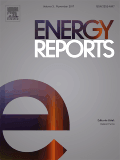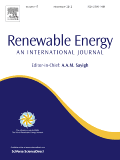
Advanced Energy and Sustainability Research
Scope & Guideline
Fostering Collaboration for Global Sustainability
Introduction
Aims and Scopes
- Energy Conversion Technologies:
Research on novel technologies for converting energy from various sources, including solar, wind, and biomass, into usable forms. This encompasses studies on photovoltaic systems, thermoelectric materials, and innovative catalysts. - Energy Storage Systems:
Focus on the development of advanced materials and systems for energy storage, including batteries (lithium-ion, sodium-ion), supercapacitors, and hybrid systems. Research often explores the electrochemical performance and stability of these storage systems. - Sustainable Materials and Processes:
Development and application of sustainable materials, such as biodegradable polymers and biomass-derived materials, aimed at reducing environmental impact while enhancing performance in energy applications. - Electrocatalysis and Photocatalysis:
Innovative electrocatalytic and photocatalytic processes for energy conversion, including hydrogen production, CO2 reduction, and organic pollutant degradation. This area emphasizes the design and optimization of catalysts. - Smart and Integrated Energy Systems:
Research on the integration of renewable energy sources into smart grids and microgrids, focusing on energy management, sharing economies, and community-level energy solutions. - Environmental Impact and Life Cycle Assessment:
Studies that evaluate the environmental impacts of energy technologies through life cycle assessments, aiming to promote sustainable practices within energy production and consumption.
Trending and Emerging
- Advanced Energy Harvesting Technologies:
There is a growing emphasis on novel energy harvesting methods, including triboelectric and piezoelectric systems, which capture energy from mechanical movements or environmental sources. - Hybrid and Multi-Functional Energy Systems:
Research is increasingly focused on hybrid systems that integrate multiple technologies, such as combining batteries with supercapacitors or integrating renewable energy sources with energy storage solutions to enhance overall efficiency. - Artificial Intelligence and Machine Learning in Energy Systems:
The application of AI and machine learning for optimizing energy systems, predicting performance, and enhancing the design of energy technologies is gaining traction, reflecting a broader trend in leveraging data and computational methods. - Recycling and Resource Recovery in Energy Technologies:
Emerging interest in sustainable practices related to the recycling of materials used in energy technologies, including batteries and solar cells, to promote a circular economy and reduce environmental impact. - Carbon Capture and Utilization Technologies:
Increased focus on technologies aimed at capturing and utilizing carbon dioxide emissions, reflecting global efforts to mitigate climate change and advance sustainable energy practices.
Declining or Waning
- Conventional Fossil Fuel Technologies:
Research related to fossil fuel energy technologies has seen a decline as the focus shifts towards renewable energy sources. The journal has increasingly prioritized studies on sustainable and renewable alternatives. - Basic Research on Traditional Battery Technologies:
While foundational research on conventional lithium-ion batteries remains important, there has been a noticeable decline in publications focused solely on traditional battery chemistries without innovative enhancements or sustainable approaches. - Single-Use Plastics and Non-Recyclable Materials:
Studies centered on the development or use of single-use plastics are waning as the journal emphasizes sustainability and the circular economy, promoting research into biodegradable and recyclable materials instead. - Thermal Energy Storage without Sustainable Context:
Research on conventional thermal energy storage systems that do not integrate sustainable practices or materials is receiving less attention, as the journal aims to highlight innovative and environmentally friendly solutions.
Similar Journals

AIMS Energy
Catalyzing Progress in Energy Engineering and TechnologyAIMS Energy is a leading academic journal published by the American Institute of Mathematical Sciences (AIMS), dedicated to advancing the field of energy research. With a strong commitment to Open Access since its inception in 2013, this journal offers a platform for researchers, professionals, and students to share innovative findings and enrich the discourse in crucial areas such as Energy Engineering and Power Technology, Fuel Technology, and Renewable Energy, Sustainability and the Environment. Recognized for its quality, AIMS Energy holds a respectable impact with a Q3 ranking in multiple categories as of 2023, and it ranks within the top half of its peers in the Scopus database. The journal's objective is to disseminate high-quality research that addresses contemporary challenges in energy and offers sustainable solutions. By fostering collaboration and discussion among various stakeholders, AIMS Energy plays a critical role in shaping the future of energy technologies and policies.

Carbon Energy
Advancing sustainable solutions for a greener tomorrow.Welcome to Carbon Energy, an esteemed open-access journal published by WILEY that focuses on cutting-edge research in the field of energy and materials science. Since its inception in 2019, this journal has quickly established itself as a leading platform for disseminating impactful findings and innovations related to carbon-based energy solutions, renewable resources, and sustainability practices. With its impressive Q1 rankings in multiple categories—including Energy (miscellaneous), Materials Chemistry, and Renewable Energy—Carbon Energy is recognized for delivering high-quality, peer-reviewed content that meets the rigorous standards of the academic community. Through its open-access model, the journal ensures wide accessibility of research findings, making it an invaluable resource for researchers, professionals, and students alike. As we look toward the future, Carbon Energy aims to further its mission of advancing sustainable energy technologies and promoting interdisciplinary collaboration in tackling global energy challenges.

Energy & Environmental Materials
Leading the Charge in Sustainable Material ScienceEnergy & Environmental Materials, published by WILEY, is an esteemed academic journal dedicated to pioneering research in the multifaceted domains of energy, environmental science, and materials science. Since its inception in 2018, this journal has rapidly established itself as a leading platform, holding a prestigious Q1 ranking across multiple categories including Renewable Energy, Sustainability, and Waste Management, reflecting its significant contributions to advancing knowledge in these critical areas. With a robust Scopus ranking that positions it in the top percentile for Environmental Science and Materials Science, it caters to a diverse audience of researchers, professionals, and students seeking cutting-edge findings and practical applications in energy efficiency and sustainable materials. This open-access journal facilitates the dissemination of innovative research and aims to bridge the gap between scientific exploration and real-world solutions for a sustainable future. The editorial team encourages submissions that explore both theoretical and practical aspects, ensuring that every publication not only contributes to the academic landscape but also drives impactful change in energy and environmental practices.

Energy Reports
Advancing Sustainable Energy Solutions for a Global AudienceEnergy Reports, published by Elsevier, is a prestigious open access journal that serves as a vital resource in the field of energy research. Since its inception in 2015, this journal has swiftly ascended to become a key player in disseminating knowledge across various energy-related disciplines, evident from its impressive Q2 ranking in the miscellaneous category of Energy for 2023 and its notable position in the 78th percentile among over 70 journals in the general energy category, ranked 16th out of 73 on Scopus. Based in the United Kingdom, Energy Reports not only fosters innovative research but also promotes accessibility by providing open access to its articles, thereby ensuring that findings reach a global audience of researchers, professionals, and students. With a commitment to advancing sustainable energy solutions and technologies, Energy Reports plays a crucial role in shaping future energy policies and practices, making it an essential platform for scholarly communication in the ever-evolving landscape of energy research.

MRS Energy & Sustainability
Advancing Energy Solutions for a Sustainable FutureMRS Energy & Sustainability is a premier interdisciplinary journal published by SpringerNature, focusing on advancing the understanding of energy systems and sustainability within the context of materials science and engineering. Since its inception in 2014, this journal has rapidly gained recognition in the academic landscape, achieving impressive rankings including Q1 in Electronic, Optical and Magnetic Materials and Mechanics of Materials, and Q2 in Energy Engineering and Power Technology as well as Renewable Energy, Sustainability and the Environment, as of 2023. The journal's ISSN is 2329-2229 and E-ISSN is 2329-2237. With a commitment to open access, it provides researchers and professionals with the latest findings and insights essential for guiding innovations in energy solutions and sustainable practices. The journal's global reach and high-impact reputation make it an invaluable resource for scientists, engineers, and policymakers dedicated to addressing the contemporary challenges of energy and sustainability. With a diverse scope and high Scopus rankings, MRS Energy & Sustainability continues to be at the forefront of research that shapes our energy future.

Green Energy & Environment
Empowering Sustainable Solutions for a Greener Tomorrow.Green Energy & Environment, published by KEAI PUBLISHING LTD, stands as a pioneering journal dedicated to the dynamic fields of renewable energy, sustainability, and environmental science. With its ISSN 2096-2797 and E-ISSN 2468-0257, this Q1 journal holds a noteworthy presence in academic discourse, reflecting its high-quality contributions within these critical areas of research. Launched in 2016, it has consistently embraced an Open Access model, facilitating unhindered access to research findings and fostering collaboration across global communities. Based in Beijing, China, this journal is dedicated to disseminating innovative insights that are essential for addressing urgent global challenges related to energy and environmental sustainability. Researchers, professionals, and students alike benefit from a platform that not only showcases pioneering research but also encourages interdisciplinary dialogue and knowledge exchange in the pursuit of a sustainable future.

Advances in Energy Research
Pioneering Innovations in Energy Efficiency and Technology.Advances in Energy Research is a prominent journal dedicated to the exploration and advancement of energy technologies and sustainable practices. Published by TECHNO-PRESS, this journal serves as a vital platform for researchers, professionals, and students in the energy field, featuring innovative studies and reviews that contribute to the body of knowledge surrounding energy efficiency, renewable resources, and the integration of new technologies. The journal holds a significant position in energy research and aims to facilitate the dissemination of groundbreaking findings and ideas that are pivotal for the transition toward a more sustainable energy future. Located in South Korea, with an ISSN of 2287-6316, it embraces an open access philosophy that ensures widespread availability of its content, further enhancing its impact in the academic community.

Journal of the Japan Institute of Energy
Connecting Ideas to Energy Solutions.Journal of the Japan Institute of Energy, ISSN 0916-8753, is a reputable academic journal dedicated to the field of energy studies, reflecting the dynamic and evolving landscape of energy research. Published by the Japan Institute of Energy, the journal serves as a platform for disseminating innovative research, technologies, and methodologies related to energy engineering, renewable energy sources, and sustainability practices. While this journal does not currently offer open access, it remains a vital resource for professionals, researchers, and students alike, particularly those focused on advancing knowledge within Energy Engineering and Power Technology, Fuel Technology, and related areas. As of 2023, it is ranked in the Q4 quartile across several categories in Scopus, which highlights its foundational role in fostering scholarly discourse, despite its lower ranking in the competitive global landscape. Established in 1990 and continuously evolving, the journal provides insights into the challenges and innovations in the energy sector, making it an essential read for anyone invested in the future of energy solutions.

Problemele Energeticii Regionale
Exploring Regional Challenges in Energy SustainabilityProblemele Energeticii Regionale is a notable academic journal focused on the field of energy engineering and sustainable energy solutions, published by the Institute of Power Engineering, Academy of Sciences of Moldova. Since its inception in 2005, this Open Access journal has become a significant platform for disseminating research and innovations in various energy-related domains, including renewable solutions, fuel technology, and energy sustainability. While its impact factor metrics suggest it currently resides in the Q4 quartile category across multiple scopes—such as Energy Engineering, Power Technology, and Renewable Energy—it provides critical insights that can pave the way for advancements in regional energy challenges. Researchers, professionals, and students alike will find this journal an essential resource for understanding and contributing to the ongoing discourse in the energy sector. With its commitment to accessibility and knowledge sharing, Problemele Energeticii Regionale aims to foster a collaborative and informed community focused on energy innovation and sustainability.

Renewable Energy
Innovating Tomorrow's Energy Solutions.Renewable Energy is a prestigious international journal published by PERGAMON-ELSEVIER SCIENCE LTD, dedicated to advancing the field of renewable energy technologies and their applications. Since its inception in 1991, this journal has provided a critical platform for researchers, professionals, and students to explore innovative solutions in renewable energy, sustainability, and environmental protection. With an impressive impact factor and ranked in the top quartile (Q1) of its category, Renewable Energy is recognized for its high-quality, peer-reviewed research that significantly contributes to the scientific and professional discourse in the sector. The journal is indexed in Scopus, holding an esteemed rank of #21 out of 270 in its field, underscoring its influence and reach. Researchers can access the journal’s articles through traditional subscriptions, ensuring a broad dissemination of vital knowledge that supports the global transition to sustainable energy sources. Addressed from its headquarters in Oxford, England, Renewable Energy is crucial for anyone involved in the journey towards a sustainable future, fostering collaboration and innovation in a critical area of environmental science.